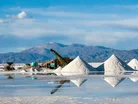EU 'Falling Short' of CRMA Rare Earth Minerals Targets

The EU is struggling to meet most of the goals surrounding rare earth minerals, according to production forecasts published by Reuters.
Missing targets in the Critical Raw Materials Act (CRMA) could impact the EU’s zero carbon goals. It also increases the prospect of further dependence on China, which accounts for 98% of EU rare earth permanent-magnet imports.
European Commission spokesperson Johanna Bernsel said the EU would “do its best to promote projects that help meet the goals in the CRMA”.
"Projects in Europe will benefit from a streamlined permitting process, as well as coordinated support for accessing de-risking financing tools and matchmaking with downstream users," Bernsel added.
Under the CRMA, which came into force in May 2024, the EU has set 2030 targets for domestic production of critical minerals required for its green transition, of 10% of annual needs mined, 25% recycled and 40% processed domestically by the end of the decade.
The CRMA was proposed by the European Commission in 2023, and is designed to secure the European Union's supply of those raw materials deemed essential for its green and digital transitions.
CRMA sets out list of strategic raw materials
The Act establishes a list of strategic raw materials, including lithium, rare earth elements, and cobalt, which are crucial for technologies such as electric vehicles, wind turbines, and semiconductors. EU demand for rare earth minerals is forecast to soar six-fold in the decade to 2030 and sevenfold by 2050.
It introduces measures to streamline permitting processes for strategic projects, enhance recycling efforts, and diversify supply chains through partnerships with resource-rich nations.
Since its introduction, the Act has prompted increased investment in mining and processing projects within the EU. Member states are reviewing their regulatory frameworks to facilitate domestic extraction, while companies are exploring opportunities to establish processing facilities. The legislation has also spurred research into substitution technologies and recycling methods.
The Act marks a shift in the EU's approach to raw materials, from what was previously a largely import-dependent strategy to one that prioritises domestic production and processing.
CRMA aligned with US's Inflation Reduction Act
It aligns with similar initiatives in other regions, such as the United States' Inflation Reduction Act, which also aims to bolster domestic supply chains for critical minerals.
In the broader geopolitical context, the CRMA is part of the EU's effort to reduce its reliance on China, which dominates the global supply of many critical raw materials.
The legislation reflects growing concerns about supply chain vulnerabilities exposed by recent global events, including the COVID-19 pandemic and ongoing geopolitical tensions, including the ongoing conflict in Ukraine and the trade war between China and the US.
The EC hopes the Act will reshape trade relationships and investment patterns in the raw materials sector, and help forge new partnerships between the EU and resource-rich countries in Africa and Latin America.

